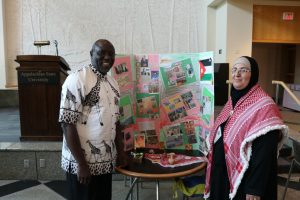The High Country to Romania: Professor awarded second Fulbright scholarship
November 20, 2019
Mountains and tight knit communities close the similarities between Appalachia and Romania. From its folklore and dance to old world architecture, the Eastern European nation has its own world of experiences.
Mark Powell, an associate creative writing professor at App State, received a grant from the Fulbright Scholar Program to teach American literature in Romania. This award marks Powell’s second grant from the program; he received the first in 2014 to teach American literature in Slovakia.
Senator J. William Fulbright founded the Fulbright Scholar Program in 1946 to encourage global communication and understanding. The program grants thousands of students and teachers international opportunities. According to its website, the program offers over 470 teaching and research positions in 125 countries each year. The subject matter ranges from art and literature to science and mathematics.
“To me, it’s just the best use of money for the government. (Slovakia is) one of the last places in Europe that isn’t really Westernized, which is what makes it so interesting,” Powell said. “I think a country’s stories are important in how we understand a country. I mean, it’s one thing to read it in the history books, but you really gain a surer understanding of people by the stories they tell.”
Powell said broad cultural exchange is important for understanding one another, and his traveling has provided an outside perspective of how the United States appears.
“In many parts of the world, we’ve come to be viewed in a monolithically negative way, but I think the important thing is to understand the nuances of American culture,” Powell said. “If you were to read our poetry or our books, then you would have a better understanding of who we are in our everyday lives.”
The trip to Romania will be his first, and Powell said he thought experiencing a new culture is what he needs.
“I’m really looking forward to being in a different kind of world. It’s kind of like a frontier in its own way, and I’m curious to see how the society is similar to our own despite cultural differences,” Powell said.
With five novels already published and another one set for 2020, Powell said he hopes to use this experience to help improve his writing.
“I think it’s going to make me adjust things on the fly more, and that’s what’s really cool about seeing different cultures like this. The larger point is putting yourself in a place where you’re uncomfortable,” Powell said.
Zoe Blandford, a senior creative writing major, was in Powell’s creative writing prose class her freshman year.
“He was my first ever creative writing professor, and he’s really nurturing while still being helpful,” Blandford said. “He would hand out short stories and have us write our own based on key aspects of the story, like a pivotal moment or the style used. It was exercises like that, that got everyone really in a creative mindset.”
Originally from Mountain Rest in Southern Appalachia, Powell said growing up in the South has influenced his perspective on travel and experiencing new things.
“I’m sure everything I’ve experienced has put things through a certain lens. Whether that’s good or bad, I don’t know, but I think this is part of what makes Eastern Europe so interesting to me is the family-oriented society,” Powell said.














